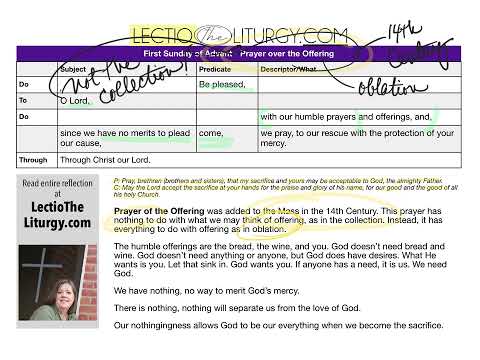Prayer over the Offering 2nd Sunday of Advent
This week we Lectio the Liturgy with the Prayer over the Offering for the Second Sunday of Advent.
Fairly new to our liturgy, the Prayer over the Offering was added to the mass in the 14th Century. This prayer has nothing to do with what we may think of offering, as in the collection. Instead, it has everything to do with offering as in oblation. The offering isn’t just bread and wine, as we’ll see in this week’s prayer.
The placement of the Prayer over the Offering in the Mass is at the end of the preparation of the altar. You’ll recognize the dialogue before the prayer, I’m sure.
The priest leads, “Pray, brethren (brothers and sisters), that my sacrifice and yours may be acceptable to God, the almighty Father.”
The congregation responds, “May the Lord accept the sacrifice at your hands for the praise and glory of his name, for our good and the good of all his holy Church.”
Then the Priest, with hands extended, says the Prayer over the Offerings.
The prayer for the Second Sunday of Advent reads:
Be pleased, O Lord, with our humble prayers and offerings, and, since we have no merits to plead our cause, come, we pray, to our rescue with the protection of your mercy. Through Christ our Lord.
At the end of which the people acclaim: Amen.
We have nothing. We can’t even earn anything. There is no way to bargain to gain God’s mercy. It’s a humbling thought, isn’t it? This is a difficult thought for those people who have been in times where there was no unconditional love. They think that they need to perform or work to deserve or earn God’s love or approval. Yet, the prayer tells us that all we have are our humble prayers and offerings.
The humble prayers might sound like this: “OK, Lord, if I can’t earn this, there is no way I can make myself good enough,” and God says, “You got that right. That’s my job. I love you just like you are.”
The humble offerings are the bread, the wine, and you. God doesn’t need bread and wine. God doesn’t need anything or anyone, but God does have desires. What He wants is you. Let that sink in. God wants you. If anyone has a need, it is us. We need God.
Those humble gifts of bread and wine? If God can make bread and wine become the body, blood, soul, and divinity of Jesus, just imagine what can he do with a humble, willing offering that is you. That humble, willing you is the recipient of the protection of Gods mercy.
Mercy is a different than love. Mercy is defined as compassion or forgiveness shown toward someone whom it is within one's power to punish or harm. Pope Francis said,”Faithfulness in mercy is the very being of God and that is why this God is totally and forever reliable.” We don’t have to earn mercy, we do need to let God pour it out on us.
As I meditated on having nothing, no merits, no way to earn God’s kindness, I was reminded of another nothing. This nothing is found in Romans 8:38, there is nothing that can separate us from the love of God. Our nothingingness allows God to be our everything when we become the sacrifice.
Thanks for praying with me,
Julie
